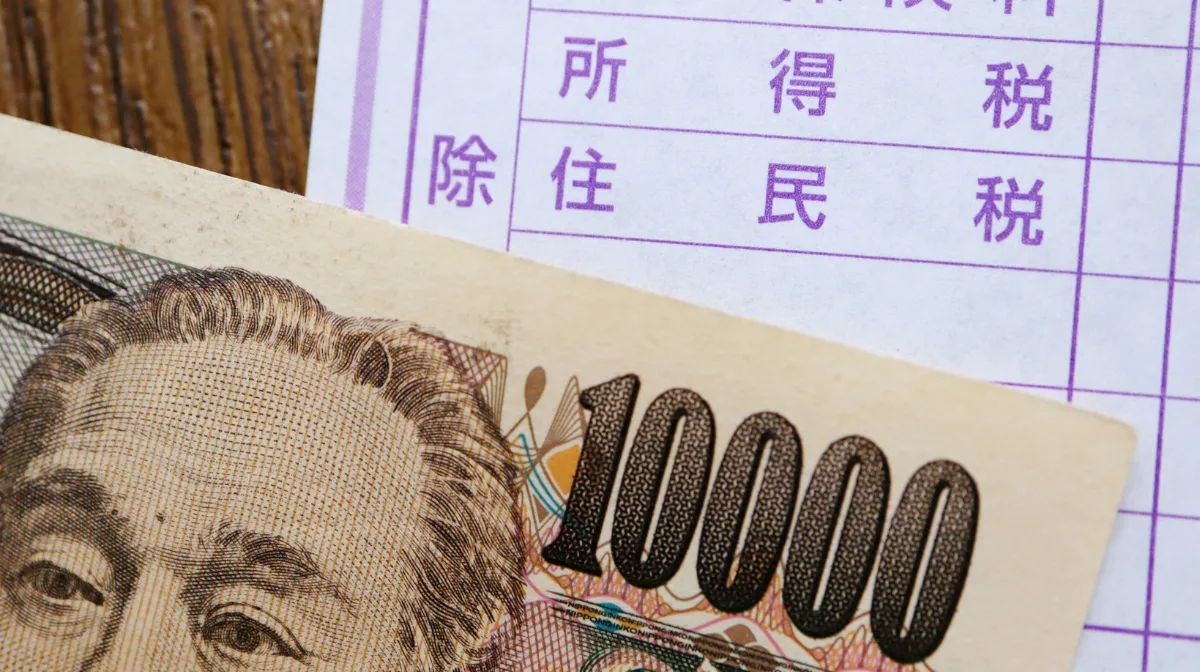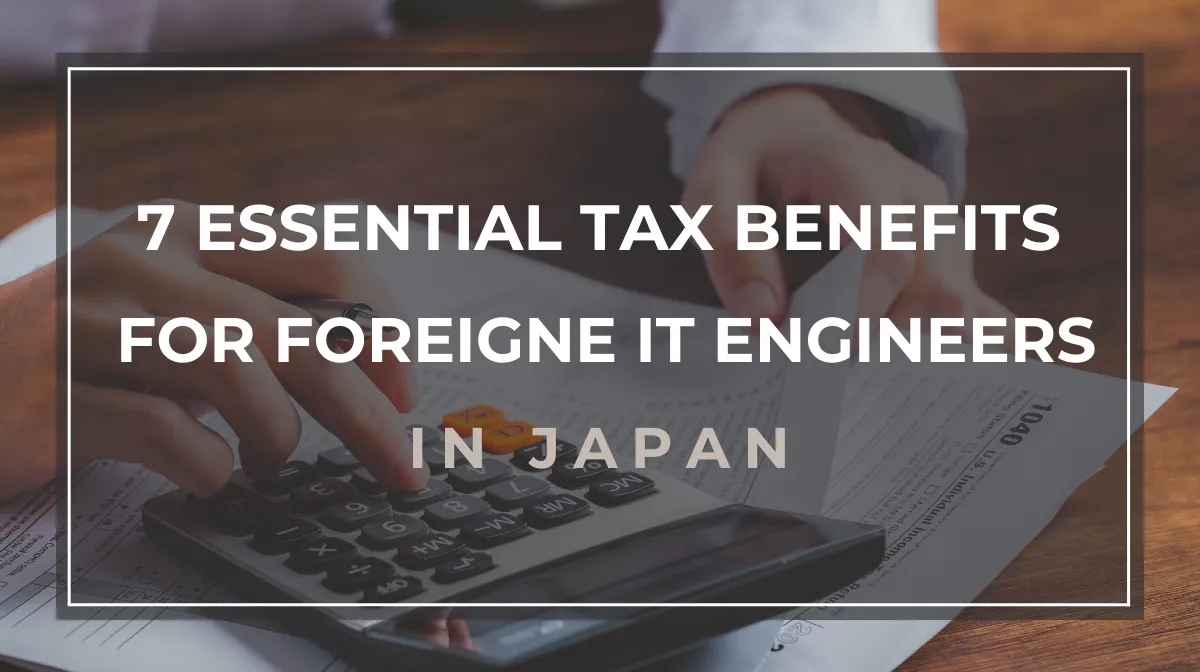Understanding the Japanese tax system is essential for foreign IT engineers working in Japan to maximize their take-home income.
While Japan’s tax system offers various preferential measures for foreign nationals, many find them complex and difficult to fully utilize.
This article provides a comprehensive explanation of seven tax incentives that foreign IT engineers should know, from the Highly Skilled Professional Points-based System to utilizing non-resident periods.
- Japanese tax classifications for foreign engineers.
- Seven key tax incentives for foreigners in Japan.
- Tax strategies for different career stages.
1. Basics of the Japanese Tax System for Foreign Nationals

Let’s explore how foreign nationals are treated in the Japanese tax system and understand its basic structure. It’s important to understand the distinction between residents and non-residents.
Differences Between Residents and Non-Residents and Their Impact on Taxation
In the Japanese tax system, foreign nationals are classified into two categories: “residents” and “non-residents” and this classification significantly affects the scope of taxation.
Residents
- Refers to individuals who have a domicile in Japan or have had a residence in Japan for two years or more
- Fully taxed on income earned in Japan, and overseas income is also taxed on portions remitted to Japan
Non-residents
- Non-residents are individuals who do not fall under the resident category
- Taxed only on income earned in Japan, overseas income is not taxed
Reference: National Tax Agency: Residents and Non-residents
Types of Taxes IT Engineers Should Know
The main taxes that IT engineers working in Japan should understand are income tax, residence tax, consumption tax, and social insurance premiums.
- Income tax is a national tax imposed on annual income, with progressive tax rates ranging from 5% to 45%
- Residence tax is calculated based on the previous year’s income and is a local tax paid to local governments.
- Consumption tax is an indirect tax paid when purchasing goods and services, with a tax rate of 10% (8% for items subject to the reduced tax rate)
- Social insurance premiums are not strictly taxes but are important expenses deducted from salaries, including health insurance and pension insurance premiums.
2. Tax Incentive System for IT Engineers ①: Highly Skilled Professional Points-based System

To promote the settlement of foreign nationals with advanced expertise, including IT engineers, the Japanese government has introduced the “Highly Skilled Professional Points-based System.”
Tax Benefits Under the Highly Skilled Professional Points-based System
The Highly Skilled Professional Points-based System awards points for categories such as academic background, work experience, and annual income, and recognizes foreign nationals who score 70 points or more as “Highly Skilled Professionals”
Obtaining the Highly Skilled Professional residency status may qualify you for the following tax incentives
- Indirect salary increases through R&D tax incentives
- Special taxation provisions for stock options
- Expanded employment income deductions and other tax incentives
Furthermore, transitioning to Highly Skilled Professional (ii) status provides a significant benefit of exemption from inheritance and gift taxes on overseas assets.
Reference: Immigration Services Agency: Highly Skilled Professional Points-based System
How IT Engineers Can Earn Points
For IT engineers to score 70 points or more in the Highly Skilled Professional Points-based System, they need to earn points in various categories such as academic background, work experience, and annual income.
A doctoral degree awards 30 points, a master’s degree 20 points, and a bachelor’s degree 10 points. Work experience awards 5-20 points depending on years of experience, and annual income also adds points incrementally starting from 4 million yen.
Young IT engineers under 30 years of age receive 10 bonus points. Patent acquisitions and Japanese language proficiency are also important point-adding factors.
Reference: Immigration Services Agency: Point Addition System
■日本でエンジニアとしてキャリアアップしたい方へ
海外エンジニア転職支援サービス『 Bloomtech Career 』にご相談ください。「英語OK」「ビザサポートあり」「高年収企業」など、外国人エンジニア向けの求人を多数掲載。専任のキャリアアドバイザーが、あなたのスキル・希望に合った最適な日本企業をご紹介します。
▼簡単・無料!30秒で登録完了!まずはお気軽にご連絡ください!
Bloomtech Careerに無料相談してみる
3. Tax Incentive System for IT Engineers ②: Utilizing the Non-Resident Period

When foreign IT engineers begin working in Japan, they may be treated as “non-residents” for the first few months to less than a year, and utilizing this period can provide significant tax benefits.
How Non-Taxation of Foreign Income Works During the Non-Resident Period
A non-resident refers to a person who does not have a domicile in Japan and has not resided in Japan for one year or more during the past two years. During the non-resident period, income earned in Japan is taxed at a flat rate of 20.42%, but foreign income is not taxed.
For IT engineers, income from overseas clients, profits from overseas stock investments or cryptocurrency transactions, and income from intellectual property rights may potentially be tax-exempt.
Annual Schedule and Tax Strategies for IT Engineers
To maximize the benefits of the non-resident period, it’s important to strategically plan your arrival time in Japan and annual schedule.
Arriving in Japan at the beginning of January may allow you to be treated as a non-resident for the longest period in your first year. During the non-resident period, it’s advantageous to organize overseas assets and realize investment gains, and it’s also beneficial to adjust the timing of receiving bonuses or large compensation.
4. Tax Incentive System for IT Engineers ③: Benefits of Tax Treaties

Japan has concluded tax treaties with approximately 70 countries and regions worldwide, and foreign IT engineers may be able to reduce their tax burden by utilizing these benefits.
Contents of Tax Treaties with Major Countries and Their Application to IT Engineers
Tax treaties between Japan and major IT talent-sending countries such as India, China, the United States, and the Philippines offer benefits including reduced tax rates on fees/compensation related to technology transfer, tax exemption for short-term residents, and avoidance of dual enrollment through social security agreements.
For example, IT engineers from India working on short-term projects may be exempt from income tax, and the withholding tax rate on technical guidance fees and license fees is reduced to 10%.
Reference: Ministry of Finance: List of Tax Treaties
Application Procedures for Tax Treaty Benefits
To receive tax treaty benefits, you need to submit a “Notification Related to Tax Treaty” along with a certificate of residency, personal identification documents, and copies of contracts to the jurisdictional tax office through the withholding agent.
The submission deadline is generally the day before the first payment date. When applying, attention should be paid to clarifying the contract form, confirming the definition of technical services, and proving the substantive workplace.
Reference: National Tax Agency: Tax Treaty Notification
■日本でエンジニアとしてキャリアアップしたい方へ
海外エンジニア転職支援サービス『 Bloomtech Career 』にご相談ください。「英語OK」「ビザサポートあり」「高年収企業」など、外国人エンジニア向けの求人を多数掲載。専任のキャリアアドバイザーが、あなたのスキル・希望に合った最適な日本企業をご紹介します。
▼簡単・無料!30秒で登録完了!まずはお気軽にご連絡ください!
Bloomtech Careerに無料相談してみる
5. Tax Incentive System for IT Engineers ④: Specific Deductions and Tax Reduction Measures

Foreign IT engineers can legally reduce their income tax and residence tax burden by utilizing various deductions and tax reduction measures available in the Japanese tax system.
Major Deduction Items IT Engineers Should Apply For
Employed IT engineers can utilize specific expense deductions for job-related expenses such as programming training costs, technical books, qualification acquisition costs, and remote work-related communication expenses.
Freelance engineers can expense home office costs, development equipment costs, software costs, and communication expenses.
Foreign engineers planning to settle in Japan should also consider housing loan deductions. Medical expense deductions and foreign tax credits may also be applicable.
Reference: National Tax Agency: Specific Expense Deduction for Employed Persons
Tips for Deduction Applications in Tax Returns
If you need to file a tax return (e.g., if your salary income exceeds 20 million yen, you receive salaries from multiple sources, or you have income other than salary exceeding 200,000 yen), prepare income and deduction-related documents thoroughly and consider using e-Tax.
Foreign engineers should pay particular attention to clarifying resident status, attaching Japanese translations to foreign language documents, and preparing remittance certificates.
Deduction items that IT engineers often overlook include costs for work devices, cloud service usage fees, and utilities for home offices.
Reference: National Tax Agency: Tax Return Preparation Guide for Foreigners
6. Tax Incentive System for IT Engineers ⑤: Measures for Entrepreneurs and Freelancers

Various tax incentives are also available for foreign IT engineers who start businesses or work as freelancers in Japan.
Benefits of Incorporation and Tax Advantages
Incorporation increases flexibility in expense accounting, enables optimization of social insurance, and allows utilization of tax-efficient welfare benefit systems. There are also benefits such as an increased limit for blue return special deductions and an extended loss carryforward period.
IT startups should also consider venture investment promotion tax incentives, angel tax incentives, and R&D tax incentives.
Important Points for Foreign Engineers Establishing Corporations
- Residency status issues
- Language and cultural barriers
- Difficulties in opening bank accounts, etc.
Reference: National Tax Agency: Blue Return Special Deduction
Tax-Saving Strategies for IT Engineers’ Freelance Work and Startups
Freelance IT engineers should properly expense development equipment, cloud service usage fees, a portion of rent and utilities if using part of their home as an office, technical books, and online course fees.
Utilizing blue returns and joining the Small Enterprise Mutual Aid or iDeCo (individual-type Defined Contribution pension plan) is also effective. Consider consumption tax special measures and fixed asset depreciation strategies.
IT engineers with side jobs need to pay attention to clarifying income categories, appropriate allocation of expenses, and timing of tax returns.
7. Tax Incentive System for IT Engineers ⑥: Pension and Social Insurance Exceptions

Social insurance premiums are also an important economic burden for foreign IT engineers, but there are special measures allowing exemptions, grace periods, and international adjustments if specific conditions are met.
How to Utilize Social Insurance Premium Exemption and Grace Period Systems
Freelance and self-employed IT engineers may be eligible for the national pension insurance premium exemption or grace period system.
There are graduated systems ranging from full exemption to quarter exemption, and applications can be made at the municipal office or pension office of your residence.
While receiving exemptions or grace periods reduces the economic burden, there is a disadvantage of reduced future pension amounts, so it is recommended to strategically utilize these during periods of unstable income, such as when launching a startup.
Reference: Japan Pension Service: National Pension Insurance Premium Exemption/Grace Period
Reducing Burden Through Coordination with Home Country Pension Systems
There are social security agreements to prevent “dual enrollment” where you pay social insurance premiums in both Japan and your home country.
Japan has concluded agreements with many countries including the United States, United Kingdom, India, and China, allowing temporary dispatches (usually within 5 years) to enroll only in their home country’s system, and also enabling the aggregation of enrollment periods in both countries to determine pension eligibility.
For those from countries without social security agreements or short-term residents, there is a “lump-sum withdrawal payment” system that allows for partial refund of paid pension insurance premiums if certain conditions are met.
8. Tax Incentive System for IT Engineers ⑦: Tax Strategies When Returning Home

Final tax adjustments when returning home after working in Japan are very important. With appropriate measures, you can obtain refunds for overpaid taxes and minimize tax burdens when transferring assets.
Steps for Tax Settlement and Refund Applications at Departure
If you leave Japan in the middle of the year, a special procedure called “quasi-final tax return” is required. You must file a return for income from January 1 to your departure date by the day of departure.
Pay attention to handling special income such as remote work income and stock options. Consider designating a tax agent for tax procedures after departure.
If you resign and return home in the middle of the year, the income tax withheld may be more than the actual tax amount due, making a refund application possible. Don’t forget to settle residence tax and complete procedures for withdrawing from national health insurance and pension.
Reference: National Tax Agency
Timing to Minimize Taxes on Asset Transfers
The optimal timing from a tax perspective varies depending on the type of asset.
Special attention is needed for the transfer of assets specific to IT engineers, such as stock options/RSUs, cryptocurrencies, specialized equipment, and intellectual property rights.
Tax-advantageous periods
- For cash and deposits: Immediately after becoming a non-resident
- For stocks, investment trusts, and cryptocurrencies: Either before becoming a non-resident or after more than 5 years have passed since departure
The “Exit Tax System” introduced in July 2015 may also apply to foreign nationals with certain assets, and countermeasures such as adjustment of asset valuation and utilization of tax deferral systems should be considered.
9. Tax Consultation Resources for Foreign IT Engineers

To understand the complex Japanese tax system and implement optimal tax strategies, reliable consultation sources and information resources are essential.
List of Multilingual Tax Consultation Services
Reliable consultation sources include public institutions and private services.
Information exchange in IT industry-oriented communities is also effective, allowing you to share information with foreign engineers in similar situations through Tech-Meetups and online communities.
When choosing a tax accountant, check language support, expertise in the IT industry and international taxation, online availability, and clear fee structure.
Free or Low-Cost Consultation Services by Public Institutions
There are free or low-cost consultation services provided by public institutions such as the National Tax Agency’s “Tax Answer” (available in English, Chinese, and other languages), regional international exchange associations, and employment service centers for foreigners.
Reference: Immigration Services Agency: Life Support Portal Site “Taxes”
Private Services
Private services are also abundant, including multilingual tax accountant offices, foreign-affiliated accounting firms, and online tax consultation services.
Online Tax Calculation Tools and How to Use Them
You can estimate income tax and residence tax using tools such as the National Tax Agency’s Tax Return Preparation Corner (partially available in English) and various take-home pay calculation tools. Foreign exchange and international remittance calculation tools such as remittance fee comparison sites and exchange rate calculators are also useful.
Multilingual support is increasing for freelancer accounting software, expense management apps, and invoice creation tools. Utilize industry-specific tools related to investment and asset formation, overseas assets and international taxation, and stock option tax calculators.
10. Maximizing Income as an IT Engineer with Optimal Tax Strategies

By appropriately combining various tax incentives and special measures, foreign IT engineers can legally reduce their tax burden and maximize their take-home income.
Recommended Tax Incentive Utilization by Income Level
Junior Engineers (Annual Income 4-6 Million Yen) For junior engineers with annual incomes of 4-6 million yen, maximizing blue return special deductions (for freelancers), maximizing various income deductions, utilizing the non-resident period, and considering housing loan deductions are effective.
Mid-level Engineers (Annual Income 6-10 Million Yen) For mid-level engineers with annual incomes of 6-10 million yen, maximizing iDeCo utilization, considering applying for the Highly Skilled Professional Points-based System, utilizing specific expense deductions, and considering incorporating side businesses are effective.
High-level Engineers (Annual Income 10+ Million Yen) For high-level engineers with annual incomes of 10+ million yen or more, considering incorporation, actively utilizing the Highly Skilled Professional Points-based System, international tax planning, planned utilization of retirement allowances and retirement income, and considering investment-related tax incentives are recommended.
Long-term Tax Strategies According to Career Stage
As tax systems change frequently, it’s important to regularly check for the latest information and continuously review your optimal tax strategy for your situation, consulting with experts as needed.
Career Start Period (Years 1-3)
During the career start period (years 1-3), it’s important to understand the basics of the Japanese tax system, maximize utilization of the non-resident period, plan future visa status, and ensure application of basic deductions.
Career Development Period (Years 4-10)
During the career development period (years 4-10), key points include balancing asset formation and tax savings, linking career advancement with tax incentives, adapting tax planning to changes in family composition, and developing tax strategies for side jobs and concurrent employment.
Career Maturity Period (10+ Years)
During the career maturity period (10+ years), asset management in anticipation of retirement/return to home country, consideration of incorporation or entrepreneurship, tax management of diverse income sources, and long-term planning with inheritance and gifts in mind are necessary.
During the period of considering departure/return to home country, it’s important to address exit taxation, optimize taxation of pensions and retirement allowances, optimize asset transfers, and prepare for tax measures after returning home.
11. Excelling as a Foreign Engineer in Japan by Understanding Tax Incentives
While Japan’s tax system is complex, foreign IT engineers can gain significant benefits by having the right knowledge and planning strategically.
It’s important to choose the right incentive system for your situation, from understanding resident status to utilizing the Highly Skilled Professional Points-based System and applying for appropriate deductions.
As tax systems change frequently, continuously review your tax strategy while incorporating expert advice.
Related Reading
The following articles introduce interview strategies for Japanese companies and how to write resumes and CVs.



















